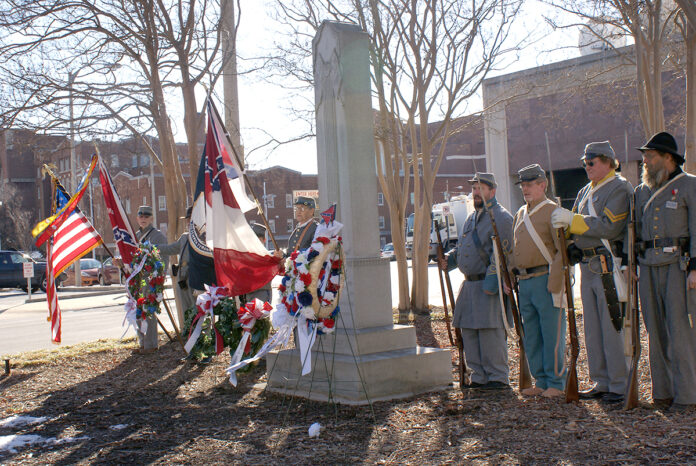A day before many observed the birthday of Dr. Martin Luther King Jr., including a holiday for some, other Roanokers gathered downtown to pay homage to General Robert E. Lee, laying wreaths and reciting a poem at Lee Plaza. The Sons of Confederate Veterans, the United Daughters of the Confederacy, the Military Order of the Stars and Bars and the Order of the Confederate Rose were all present.

The wreath-laying event also included prayer and the singing of “Dixie” at its conclusion. David McCorkel, a 3rd Brigade commander in the Virginia Division of the Sons of Confederate veterans, read a poem entitled Robert E. Lee by William Shakespeare Hays, after realizing his first choice for a poem wouldn’t work – it was written by Northerner Harriett Beecher Stowe, the ardent abolitionist and author of Uncle Tom’s Cabin, back in the mid-1800’s.
Lee, a West Point graduate near the top of his class, was actually offered the command of the Union Army in 1861 but his Virginia roots prevented him from accepting the post. A year later he led the Confederate Army into battle. After Lee surrendered to Ulysses Grant at Appomattox in 1865 he went on to become president at then-Washington College (now Washington and Lee), dying in 1870.
Members of the Sons of Confederate Veterans (SCV) or the women’s auxiliary groups must be able to trace their family roots back to the Civil War. Charles Poland, who handles local publicity for the SCV, can go back even further, to the American Revolution and even the Pilgrims on the Mayflower. He had relatives who fought on both sides of the bloody War Between the States.
“We’ve done this [Lee observance] for several years,” said Poland, adding that Stonewall Jackson, the revered Confederate general, had also been honored last week in conjunction with Lee-Jackson Day. “Its to keep alive the heritage of the Confederate tradition,” noted Poland, and to salute Lee, whom he called “an honorable man.” People on both sides of the conflict considered General Lee to be an honorable man, a soldier who had fought for the United States before it was split apart by civil war.
Poland’s ancestor was a cavalry officer in Russell County, in the militia. As to those who feel honoring Robert E. Lee may pick at the scab of slavery and racism, Poland offers this thought: “if you don’t know where you were, you don’t know where you are. You need to understand what people went through to get here. You need to understand what they went through and what they suffered. In a way it’s picking at a scab – but scabs heal.”
by Gene Marrano


